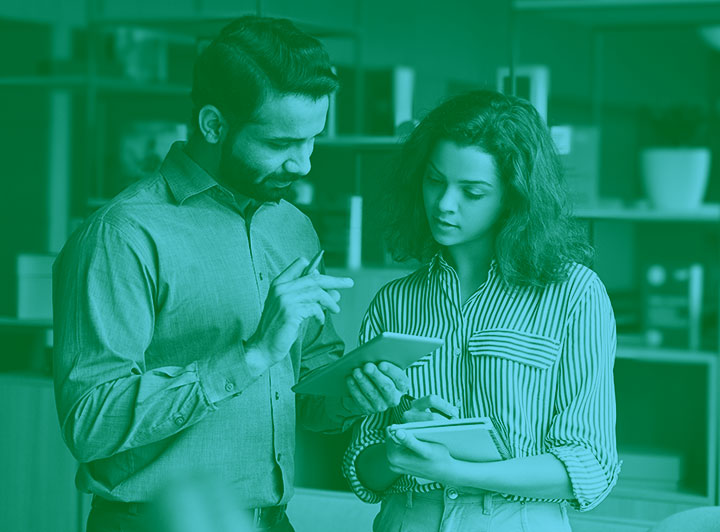Overview

Complete the Sustainability program with our flexible online courses
Whether you want to launch a career in Sustainability or expand your knowledge of sustainable environment, economic and societal best practices, our online program can help. Gain in-demand skills for this rewarding profession.
- Designed with reference to several ISSP-SA (International Society of Sustainability Professionals) core competencies
- Gain sustainability skills and knowledge of the best practices
- Successfully complete any three out of the four online courses to earn a Certificate of Completion and receive a microcredential that highlights the specific skills you’ve learned
Information Box Group

Program highlights Learn More
- Flexible online courses
- Taught by industry experts
- Open enrolment program
Sustainability program features:
- Learn online through instructor-led lectures and presentations
- Group discussions and networking with other professionals
- Individual and small group practical application activities
- When you successfully complete any three out the four courses, you will earn a microcredential along with your non-academic certificate of completion

What you'll learn Learn More
- Sustainability principles and best practices
- Professional strategies for sustainability
- Sustainable approaches for businesses
Through our Sustainability program, you’ll learn to:
- Recognize the role of the individual, community and business within sustainable and environmental practices
- Identify key issues within the sustainable movement, both locally and nationally
- Review primary policies and laws affecting sustainable practices
- Understand the relationship between business and consumers for sustainable action
- Examine practical tools, resources, strategies and techniques to develop sustainable living and working environments
- Explore and apply various design views/approaches for responsible sustainable living and business development
- Address such challenging issues as:
- climate change
- inequality
- social unrest
- economic instability
Learn more about the Sustainability program
- Professionals looking to develop their background in sustainability-related skillset, knowledge and best practices
- Professionals and organizations aspired to take a values-driven approach to sustainable business and explore opportunities for unlocking commercial gains while corresponding to UN sustainable development goals (SDGs) in addition having the knowledge base to address some of the global sustainability challenges.
- Purpose-driven professionals seeking to build a common understanding of business sustainability within organizations to reinvent or advance their career and explore new career paths
- Individuals in leadership positions or management roles wanting to act as an agent for positive changes and to lead the business sustainability transition within their organizations
- Individuals interested in sustainability pillars (Economy, Environment & Social) and living sustainably
- Individuals who care about the environment, the planet, and the uncertainties caused by the global economical standing and social wellbeing
- Organizations looking to build capacity around sustainability, enhance awareness, engagement and capability among employees and stakeholders
Earning a Certificate of Completion in Sustainability could put you on a path to rewarding careers, such as:
- Sustainability Specialist
- Sustainability Manager
- Environmental Consulting
- “Green” positions in a number of industries, including construction, renewable energy project management and green technologies (recycling, wastewater treatment, solar energy)
Check out our latest Program Preview webinar recording to learn more about the Sustainability program
What participants say
Nimesh Shah
Sustainability graduate
Beli Samuel Pérez
Master of Health Sciences, Project Manager
Sustainability is something that belongs to everyone. We all live on this Earth and we need to preserve it. The best way of learning how to do that is through sustainability courses.
Dr. Sam Nejatian
Sustainably Instructor, McMaster Continuing Education
Somayeh Rokhgireh
Sustainably Instructor, McMaster Continuing Education
It was really rewarding to take what I was learning in class and use it to make significant lifestyle changes.
 Sustainability programs can be a great way to develop your career in the field of sustainability. According to a Harvard Business Review article, there is no unique path when it comes to sustainability. However, there are a few ways to get started. First, know that this field is not going anywhere. Businesses are reacting to consumer demands by creating new roles focused on developing ESG-friendly practices and solutions in every function. The article suggests that you educate yourself on the three pillars of sustainability: environmental, social, and economic. The United Nations defines sustainability as “meeting the needs of the present without compromising the ability of future generations to meet their own needs.” Many international and domestic companies are rated and given an ESG (environmental, social, governance) score by third-party providers that measure their performance around each pillar. According to McKinsey, there have been more than 2,000 academic studies, and roughly 70% of them find a positive relationship between ESG scores and financial returns. Further, in 2015, the UN established 17 Sustainable Development Goals as part of its 2030 Agenda for Sustainable Development. Businesses need to do more if they wish to meet these goals in the next few years.
Sustainability programs can be a great way to develop your career in the field of sustainability. According to a Harvard Business Review article, there is no unique path when it comes to sustainability. However, there are a few ways to get started. First, know that this field is not going anywhere. Businesses are reacting to consumer demands by creating new roles focused on developing ESG-friendly practices and solutions in every function. The article suggests that you educate yourself on the three pillars of sustainability: environmental, social, and economic. The United Nations defines sustainability as “meeting the needs of the present without compromising the ability of future generations to meet their own needs.” Many international and domestic companies are rated and given an ESG (environmental, social, governance) score by third-party providers that measure their performance around each pillar. According to McKinsey, there have been more than 2,000 academic studies, and roughly 70% of them find a positive relationship between ESG scores and financial returns. Further, in 2015, the UN established 17 Sustainable Development Goals as part of its 2030 Agenda for Sustainable Development. Businesses need to do more if they wish to meet these goals in the next few years.
It was really rewarding to take what I was learning in class and use it to make significant lifestyle changes. I would encourage any McMaster student who has an interest in sustainability from a health, economic, societal, or environmental perspective to enroll in a sustainability course!
I am getting great benefits, personally as well as career growth.
Nimesh Shah
Sustainability graduate
The MCE program on sustainability studies has introduced me to a different phase of continuous learning of self-development especially in a world dominated by a centric mindset of over-consumption.
 What is sustainability?
What is sustainability?
The MCE program on sustainability studies has introduced me to a different phase of continuous learning of self-development especially in a world dominated by a centric mindset of over-consumption.
The importance of sustainability is structured on understanding the dangers of how anthropocentrism and consumerism is taking over the world and combating this.
This program was well drafted and taught, and has enabled me become more aware of my environment and better ways of not only protecting it, but creating a better society using different methodologies based on a circular economy.
Sustainability is not a curve process but a journey which we all must embrace.
This microcredential was very informative, interesting and engaging. The instructors were well knowledgeable of the subject matter.
I encourage everyone to take this program.
Anthony Ogborogu
Sustainability graduate
It is important to understand the interconnectedness of these and other issues so that the implications of our everyday household and business decisions are understood in the right context.
Sustainability seems to be a buzz word these days. I hear it mentioned on the news, in advertisements, in general conversations, and in other unexpected facets of life. I would argue that the concept of Sustainability is vital in today’s world and to our future happiness. As a Global community we are dealing with big social and environmental issues. It is important to understand the interconnectedness of these and other issues so that the implications of our everyday household and business decisions are understood in the right context. What we do and don’t do matters.
Enrolling in the McMaster Continuing Education Sustainability program has been a wonderful way to develop an understanding of the practices of Sustainability, and what we can do to support real change. I encourage everyone to look into this program and to join the conversations being held all around you. Even if you don’t decide to take this program, look into the UN Sustainable Development Goals to start understanding the interconnectedness of things and how we as individuals and businesses can make a difference.
I look forward to hearing your thoughts and ideas in a future class!
Daniel
Sustainability graduate
I encourage everyone to check the new Sustainability courses at McMaster Continuing Education! Let's become sustainability champions and make a better world for the present and future generations.
 I really enjoy this new Sustainability program at McMaster Continuing Education. I think it provides a solid foundation with relevant information and activities to expand my sustainability journey as I gradually integrate all the lessons learned at a personal and professional level.
I really enjoy this new Sustainability program at McMaster Continuing Education. I think it provides a solid foundation with relevant information and activities to expand my sustainability journey as I gradually integrate all the lessons learned at a personal and professional level.
The teachers are great and I really value the opportunity to interact and learn from other students’ experiences and discussions. The feedback provided by both teachers and students is always interesting to take into consideration as I am able to learn a lot from different perspectives and points of view within the sustainability field.
At a professional level, I have prior experience as a sustainability assistant, but now after acquiring further knowledge in the field, I feel more prepared to continue my sustainability journey both at a national and international level. I love that within the program we are able to learn much more about the UN SDGs, as I really feel this provides a solid direction for individuals and organizations towards achieving a better and sustainable world. As a personal experience, due to the COVID-19 pandemic, inspired by the UN SDG 3 & 4, I developed a virtual educational project to share the importance of psychology and mental health online, reaching over 50 000 people (in Latin America), developing a network of over 150 international professionals in support of this project with hundreds of positive feedback from different countries.
I believe that the best contribution we can make towards sustainability is to promote related education about it to all members of society. Therefore, I am also very grateful that I got the opportunity to participate in the promotion of several sustainability virtual workshops organized by Canadian non for profit organizations reaching hundreds of people in British Columbia (Vancouver) in 2021.
Learning never ends! I encourage everyone to check the new Sustainability courses at McMaster Continuing Education! Let’s become sustainability champions and make a better world for the present and future generations.
Beli Samuel Pérez
Master of Health Sciences, Project Manager
Sustainability is something that belongs to everyone. We all live on this Earth and we need to preserve it. The best way of learning how to do that is through sustainability courses.
Dr. Sam Nejatian
Sustainably Instructor, McMaster Continuing Education
Today, sustainability is not an option; it is a mindset that everyone should have when making any personal or business decision to further protect and preserve our way of living and our planet Earth.
 Sustainability is about meeting the needs of the present without compromising the ability of future generations to meet their own needs. “Today, sustainability is not an option; it is a mindset that everyone should have when making any personal or business decision to further protect and preserve our way of living and our planet earth,” says Somayeh Rokhgireh, sustainability management specialist and instructor with McMaster University’s Continuing Education Sustainability Program. Rokhgireh has been teaching students from Canada, and as far as Peru, Sudan, and Thailand to develop systems thinking and a holistic perspective on sustainable business principles and practices as well as personal consumption leading to better sustainable living.
Sustainability is about meeting the needs of the present without compromising the ability of future generations to meet their own needs. “Today, sustainability is not an option; it is a mindset that everyone should have when making any personal or business decision to further protect and preserve our way of living and our planet earth,” says Somayeh Rokhgireh, sustainability management specialist and instructor with McMaster University’s Continuing Education Sustainability Program. Rokhgireh has been teaching students from Canada, and as far as Peru, Sudan, and Thailand to develop systems thinking and a holistic perspective on sustainable business principles and practices as well as personal consumption leading to better sustainable living.
Students build insight and gain the skills to make informed decisions considering their impact on the well-being of other people and the planet. They learn how sustainable practices can help businesses proactively manage risks and turn them into opportunities. Furthermore, to enhance brand reputation and profitability while preserving natural resources and supporting a good quality of life for all,” says Rokhgireh.
Somayeh Rokhgireh
Sustainably Instructor, McMaster Continuing Education
Other programs you may be interested in
- Home
- Find Programs & Courses
- Business Programs
- Sustainability Program
Certificate in Sustainability
Sustainability Program

Earn a certificate of completion and receive a microcredential highlighting the skills you’ve gained
Upon successfully completing this program, you will receive a microcredential recognizing your learning achievement. Complete with details of the skills and specialized knowledge you have acquired, the microcredential is digitally shareable, making it easy to add to your resume, LinkedIn profile and to share with current or prospective employers.
Explore the requirements below and register today!
Information Box Group

Earn a Microcredential along with your Certificate of Completion
Upon successful completion of three out of four courses (minimum of 30 course hours), you will receive a microcredential to complement your non-academic certificate of completion. This microcredential will list all the skills you acquired during the courses for you to share and showcase to present and future employers.
Courses (complete any 3)
- Home
- Find Programs & Courses
- Business Programs
- Sustainability Program
Sustainability Schedule
Sustainability Schedule
This schedule table displays courses planned to be offered this year and is a guide to planning your courses for the academic year. Please note: Spring term registration opens mid-March and Fall/Winter term registration opens mid-July.
For more information about our learning formats and to choose a format that works best for you, please visit our Learning Formats page. All times listed below are in the Eastern Time Zone (ET).
| Course Name (Course Code) | Cost | Units | Fall 2024 | Winter 2025 | Spring/Summer 2025 |
|---|---|---|---|---|---|
| Principles of Sustainability (SUS 101) | $310.00 | Oct 21 - Nov 17 Format: Online | Jan 13 - Feb 9 Format: Online | — | |
| TBD | — | — | May 5 - Jun 1 Format: Online | ||
| Practices for Sustainable Living (SUS 102) | $310.00 | Nov 25 - Dec 22 Format: Online | Feb 17 - Mar 16 Format: Online | — | |
| TBD | — | — | Jun 9 - Jul 6 Format: Online | ||
| Practices for Sustainable Business (SUS 103) | $310.00 | Oct 21 - Nov 17 Format: Online | Jan 13 - Feb 9 Format: Online | — | |
| TBD | — | — | May 5 - Jun 1 Format: Online | ||
| Responsible Production and Consumption (SUS 104) | $310.00 | Nov 25 - Dec 22 Format: Online | Feb 17 - Mar 16 Format: Online | — | |
| TBD | — | — | Jun 9 - Jul 6 Format: Online |
The schedule table is subject to change. Please visit the course pages to browse classes currently available for registration and the latest cost information.
Admission Requirements
Admission Requirements
This program is open enrolment, which means there is no formal application or admission procedure. To enrol in a course, simply register online. Our courses can be taken as part of a program or individually.
To enrol in McMaster Continuing Education programs, you must:
- Have an Ontario Secondary School Diploma or equivalent
- Be a mature student as defined in the Undergraduate Calendar of McMaster University or
- Be deemed an exceptional case
To ensure you are successful in your online courses, you are required to have knowledge and skills with general computer applications, such as keyboarding, file management, video conferencing and word processing.
Language Requirements
If your first language is not English, you must meet the University’s English language proficiency requirements. Completion of TOEFL exam with a minimum acceptable score of 20 on each of the four components (reading, writing, speaking and listening), valid for 2 years.
Expandable List
- Visit continuing.mcmaster.ca/programs to find your program of choice
- Click on each tab on the program page to learn about credential options and requirements, schedule and fees, and a list of all courses in the program
- Select a course and then select an available offering, noting important information such as cost, delivery format, and start/end dates; then click ‘add to cart’
- Once you have added your courses, click the shopping cart icon at the top right-hand corner of the page (bottom of the browser screen on mobile)
- Review your cart and, once you’re ready to proceed with enrolment, click ‘proceed to checkout’
- As the next step, you will be redirected to Mosaic – McMaster’s Administrative Information and Enrolment system
- Once you are in Mosaic, select ‘new to McMaster’ or log in with your existing MacID and password (if applicable)
- Complete all required fields and select a program of study when prompted (i.e., a specific program or open studies for standalone courses)
- Finally, payment is required in full to secure a spot in your course(s)
A payment receipt email will be issued to you immediately after registering, and a course confirmation email will be sent to you overnight. Within approximately 24 hours of registering, you will also receive an important email containing credentials used to activate your MacID, which you must do before you can access courses in Avenue to Learn. Please review our Getting Started page to learn more about the next steps for beginning your studies after registration, and our Help Centre for our Refund Policy and other frequently asked questions. Please note that on average, each course requires 6-8 hours of study per week, per course (sometimes more) and some courses may have listed prerequisites. Please plan your schedule accordingly. Most students take 1-2 courses per term across a few different terms and a full-time equivalent course load is typically 3-4 courses per term.
For more information and a walkthrough on how to register, please check out this video.
- Payment must be made in full at the time of enrolment
- Online credit card or debit payments are preferred
- Accepted credit cards: Visa, MasterCard and American Express
- Accepted debit cards: Visa Debit and Debit Mastercard
- Google Pay is available for faster checkout
- Payments can be made from a Canadian Financial Institution and can take 2 to 4 business days to arrive in your McMaster student account. Once payment has arrived, you can register for your course. Please note that if the amount of the course fees owing is more than what was transferred to your student account, you will be dropped from the course.
- Problem processing your payment? Please reach out to your credit card company if your payment was declined. Otherwise, wait two hours before attempting your registration again.
Ready to get started?
Visit the Schedule tab to select your course and proceed with the registration steps.




